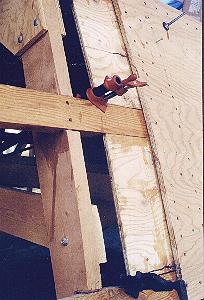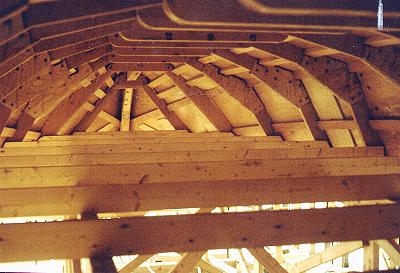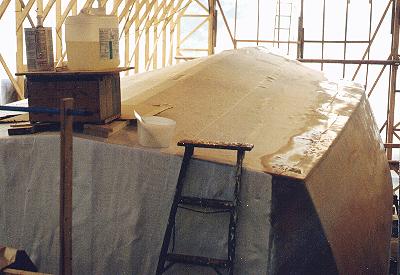Building the Glen-L Yukon
by Wayne Milner
Page 6
It was my original intention to use scarf joints to join the plywood panels on this project. Due to the difficulty involved in handling joined sheets by myself, I would have had to make the scarf joints as I came to them on the boat, rather than make them on the shop floor and try to lift the joined sheets into place. I decided that it was beyond my capabilities to make a good scarf joint. I believe that a good butt joint is probably stronger than a poor scarf joint, and I do know how to make a good butt joint, so all the joints are butt joints.
 Planking:Butt joints were used in the topsides planking. Note the butt block arrangement (in the upper right corner) to pull in the planking.
Planking:Butt joints were used in the topsides planking. Note the butt block arrangement (in the upper right corner) to pull in the planking. |
 This view shows the planking completed from the inside of the hull. Note the temporary 2x6 bracing, tying the tops of the frames together.
This view shows the planking completed from the inside of the hull. Note the temporary 2x6 bracing, tying the tops of the frames together. |
Once the planking was finished, it was time to fill all the screw holes and generally make the hull smooth preparatory to putting on the fiberglass cloth. The rudder port was installed, and the hole for the shaft where it passes through the keel was drilled. I spent eight days filling screw holes and sanding the hull to eliminate the little ridges between planking strips. The next step was to cover the hull with two layers (three layers over keel and chine) of 10-ounce fiberglass cloth and epoxy.
I measured the epoxy using household measuring cups, and mixed a quart at a time. When I first poured the epoxy on the cloth, it seemed to take me a long time to work it in. However, after I had done a couple of quarts, I got to be more skilled at working the epoxy in well with a spreader. The wood shows through when the cloth has been well saturated. It took me a day and a half to apply the cloth and epoxy. I got the sides and about a third of the bottom done the first day. I had been concerned about stopping part way through the process. Another builder suggested that I could cut the cloth where I stopped the first day, then lap it and continue the following day. I didn't do it that way. I just stopped where I was the first day and the next morning fixed up the hard edge and continued. After the job was done and set up for a few days I tried removing the cloth in a few areas to see if it had adhered to the hull sufficiently. I wasn't able to lift it, so I think it is firmly attached.
 Fiberglassing: The "dry method" of sheathing was used. Here, the cloth on one side of the hull is already saturated with epoxy and squeegeed out.
Fiberglassing: The "dry method" of sheathing was used. Here, the cloth on one side of the hull is already saturated with epoxy and squeegeed out. |